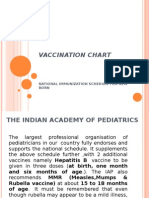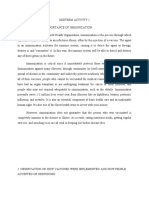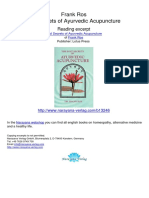Coronavirus Vaccine Tracker
Coronavirus Vaccine Tracker
Uploaded by
Jonathan Alberto Peñaranda PaezCopyright:
Available Formats
Coronavirus Vaccine Tracker
Coronavirus Vaccine Tracker
Uploaded by
Jonathan Alberto Peñaranda PaezCopyright
Available Formats
Share this document
Did you find this document useful?
Is this content inappropriate?
Copyright:
Available Formats
Coronavirus Vaccine Tracker
Coronavirus Vaccine Tracker
Uploaded by
Jonathan Alberto Peñaranda PaezCopyright:
Available Formats
Adriana Castillo
Jonathan Peñaranda
Laura Barajas
VACCINES
What is a Vaccine?
A vaccine is a biological preparation that provides active acquired immunity to a
particular infectious disease. A vaccine typically contains an agent that resembles a
disease-causing microorganism. The agent stimulates the body's immune system to
recognize the agent as a threat, destroy it, and to further recognize and destroy any
of the microorganisms associated with that agent that it may encounter in the future.
The administration of vaccines is called vaccination.
When did the vaccines appear?
The terms vaccine and vaccination are derived from Variolae vaccinae (smallpox of
the cow), the term devised by Edward Jenner in 1798 (who both developed the
concept of vaccines and created the first vaccine) to denote cowpox. In 1881, to
honor Jenner, Louis Pasteur proposed that the terms should be extended to cover
the new protective inoculations then being developed.
Types of vaccines
1. Inactivated
2. Attenuated
3. Toxoid
4. Subunit
5. Conjugate
6. Experimental
Why are vaccines important?
Since vaccines were invented, the number of people who get sick or die from
infectious diseases has dropped significantly.
We now have vaccines to prevent more than 20 life-threatening diseases, helping
people of all ages live longer, healthier lives. Immunization currently prevents 2-3
million deaths every year from diseases like smallpox, poliomyelities, yellow fever,
hepatitis B, etc. Diseases like smallpox have totally disappeared.
A natural infection can provide better immunity than vaccination, but there are
serious risks. For example, a natural chickenpox infection (chickenpox) could lead to
pneumonia. A natural polio infection could cause permanent paralysis.
Vaccines not only protect you, they protect the people around you. That means that
even people who can't get vaccinated, such as those with weak or faulty immune
systems, will have some protection against the disease.
Why do some people refuse vaccination?
There are limitations to its effectiveness.
Sometimes protection fails due to vaccine-related failures or host-related failures due
to the host's immune system.
The difficulty of reaching all children, as well as cultural misunderstandings, have
caused the planned eradication date to be missed several times, because they
thought that vaccination was not clean or because they felt that it infringed on their
freedom of choice.
In 1998, physician Andrew Wakefield published a report establishing false links
between autism and intestinal diseases with the MMR vaccine (measles, mumps,
and rubella).
HOW DO YOU GET VACCINE?
Infectious agents spread easily and the majority of the world's population is still
vulnerable to it. A vaccine would provide some protection by training people's
immune systems to fight the virus so they should not become sick.This would allow
lockdowns to be lifted more safely, and social distancing to be relaxed.
Preclinical Testing: Scientists test a new vaccine on cells and then give it
to animals such as mice or monkeys to see if it produces an immune response.
Phase 1 - Safety Trials: Scientists give the vaccine to a small number of people to
test safety and dosage as well as to confirm that it stimulates the immune system.
Phase 2 - Expanded Trials: Scientists give the vaccine to hundreds of people split
into groups, such as children and the elderly, to see if the vaccine acts differently in
them. These trials further test the vaccine’s safety and ability to stimulate the
immune system.
Phase 3 - Efficacy Trials: Scientists give the vaccine to thousands of people and
wait to see how many become infected, compared with volunteers who received a
placebo. These trials can determine if the vaccine protects against the coronavirus
How many people need to be vaccinated?
It is hard to know without knowing how effective the vaccine is going to be.It is
thought that 60-70% of people needed to be immune to the virus in order to stop it
spreading easily (known as herd immunity).But that would be billions of people
around the world even if the vaccine worked perfectly.
Would a vaccine protect people of all ages?
It will, almost inevitably, be less successful in older people, because aged immune
systems do not respond as well to immunisation. We see this with the annual flu jab.
It may be possible to overcome this by either giving multiple doses or giving it
alongside a chemical (called an adjuvant) that gives the immune system a boost.
ACTIVITY
Let's expose the theme based on a PowerPoint presentation and then we're going to
do an interactive game with questions about vaccines. We will have the roulette
game.
Questions:
1. If you had children, would you
vaccinate them? Why?
2. If the Covid-19 vaccine was available,
would you want to be vaccinated?
3. Do you know of anyone how he had
an infection because they weren't
vaccinated?
4. Do you think it would be better if
vaccines didn't exist?
5. What do you think about schools
requiring children to be vaccinated?
6. Did you receive any vaccine?
7. Do you have your up-to-date vaccine
schedule?
You might also like
- The Vitamin C Treatment of Whooping CoughDocument14 pagesThe Vitamin C Treatment of Whooping CoughoneclickgroupNo ratings yet
- E BAR - Hospital Administration Past PprsDocument25 pagesE BAR - Hospital Administration Past PprsChathurika SamarasingheNo ratings yet
- After Watching Jabbed: Love, Fear and Vaccines' Answer The Following QuestionsDocument3 pagesAfter Watching Jabbed: Love, Fear and Vaccines' Answer The Following QuestionsOrangeFoxGamerNo ratings yet
- Synthesis PaperDocument6 pagesSynthesis Paperapi-252076032No ratings yet
- GNED 1101-030 - VaccinesDocument10 pagesGNED 1101-030 - Vaccinesdessertlaza.coNo ratings yet
- Vaccines - Definition, Principle, Types, Examples, Side EffectsDocument26 pagesVaccines - Definition, Principle, Types, Examples, Side Effectssattyadev95No ratings yet
- ImmunizationDocument320 pagesImmunizationbrightonjilloNo ratings yet
- Halal Dan Haram VaksinDocument9 pagesHalal Dan Haram VaksinNunung NurazizahNo ratings yet
- Vacination NotesDocument8 pagesVacination NotesJamesNo ratings yet
- Sample Lesson Plan: (Middle School)Document10 pagesSample Lesson Plan: (Middle School)n vinay kumar reddyNo ratings yet
- 17.understanding Vaccines What They Are How They WorkDocument59 pages17.understanding Vaccines What They Are How They WorkRiyan KurniaNo ratings yet
- Vaccine ProjectDocument11 pagesVaccine Projectreubengoddey5No ratings yet
- ScriptDocument2 pagesScriptdusty kawiNo ratings yet
- VaccineDocument38 pagesVaccineKrishnanand Nagarajan100% (1)
- Routine Vaccination Questions (8Document15 pagesRoutine Vaccination Questions (82mpfoww3nNo ratings yet
- Old Diseases Are Coming Back:: Courtesy Of Anti-VaccinatorsFrom EverandOld Diseases Are Coming Back:: Courtesy Of Anti-VaccinatorsRating: 1 out of 5 stars1/5 (1)
- Speech 1Document3 pagesSpeech 1Kush AsnaniNo ratings yet
- Vaccin OlogyDocument79 pagesVaccin Ologyhamzabinamjad987No ratings yet
- FOR OR AGAINST VACCINATIONS - Essay - 01Document4 pagesFOR OR AGAINST VACCINATIONS - Essay - 01ŠefikaNo ratings yet
- Immunization NotesDocument53 pagesImmunization NotesJnanesh PuniNo ratings yet
- Vaccination: Why and When Should It Be Given?: Submitted By: Hana Esmayil Class XII - NDocument28 pagesVaccination: Why and When Should It Be Given?: Submitted By: Hana Esmayil Class XII - NPearl StarzNo ratings yet
- VACCINATIONDocument14 pagesVACCINATIONmumenyicatherineNo ratings yet
- Reading Material 1 For THE VACCINE DEBATE Student VersionDocument1 pageReading Material 1 For THE VACCINE DEBATE Student VersionAllen MedinaNo ratings yet
- VaccinesDocument55 pagesVaccinessudeepdureja75% (4)
- Class-9 Bio VaccinationDocument5 pagesClass-9 Bio VaccinationAayan RizviNo ratings yet
- Research Paper Final DraftDocument13 pagesResearch Paper Final Draftapi-4664106540% (1)
- VaccinationDocument35 pagesVaccinationmuneebazmat1123No ratings yet
- Frequently Asked Questions On Immunization (English) : 1. What Is A Vaccine?Document6 pagesFrequently Asked Questions On Immunization (English) : 1. What Is A Vaccine?L Jossenel Mejido-AñanoNo ratings yet
- What Are The Benefits and Risks of Vaccines Seen in The Last 10 Years?Document7 pagesWhat Are The Benefits and Risks of Vaccines Seen in The Last 10 Years?amysimms094No ratings yet
- Vaccine, Is It Important?: Commented (UD1) : Supporting Idea, It Can Be Used To SupportDocument2 pagesVaccine, Is It Important?: Commented (UD1) : Supporting Idea, It Can Be Used To SupportDeby SusilawatiNo ratings yet
- Ability of Vaccination in Disease PreventionDocument8 pagesAbility of Vaccination in Disease PreventionShura ShiraNo ratings yet
- Why Are Childhood Vaccines So Important?Document2 pagesWhy Are Childhood Vaccines So Important?joetimorNo ratings yet
- Final Draft, Reasearch Eassay, Pradyumna Shil SarmaDocument5 pagesFinal Draft, Reasearch Eassay, Pradyumna Shil SarmaPradyumna Shil SarmaNo ratings yet
- Vaccination and Vaccine ProductionDocument21 pagesVaccination and Vaccine Productionalbertosehi1No ratings yet
- VaccinesDocument3 pagesVaccinesBrayan DarcyNo ratings yet
- BillcreatorDocument2 pagesBillcreatorapi-336570337100% (1)
- Vaccine Research PaperDocument11 pagesVaccine Research Paperapi-534309589No ratings yet
- ImmunizationDocument15 pagesImmunizationrajgopalNo ratings yet
- Vaccination Chart: National Immunization Schedule For New BornDocument20 pagesVaccination Chart: National Immunization Schedule For New BornsmilealwplzNo ratings yet
- Practical Applications of Immunology Written ReportDocument9 pagesPractical Applications of Immunology Written ReportVincent Drystan AdronNo ratings yet
- Protecting The Public: Medical Statistician Michael AldersonDocument4 pagesProtecting The Public: Medical Statistician Michael AldersonzhumphriesNo ratings yet
- Midterm Activity ScitechDocument3 pagesMidterm Activity ScitechKean KaiNo ratings yet
- VaccinationDocument7 pagesVaccinationÁlex DunegaseNo ratings yet
- The Vaccine War A Battle Between Public Health and Personal Liberty 1Document21 pagesThe Vaccine War A Battle Between Public Health and Personal Liberty 1api-457466255No ratings yet
- Argumentative Essay FinalDocument5 pagesArgumentative Essay Finalapi-549770007No ratings yet
- Evolution of vaccine class 12 biology investigatory projectDocument37 pagesEvolution of vaccine class 12 biology investigatory projectcrack.neet.aiims2526No ratings yet
- Coronavirus VaccinationDocument13 pagesCoronavirus Vaccinationgashbin MahdyNo ratings yet
- Vaccines: Friends or Foes?: Vaksin: Sahabat Atau Seteru?Document8 pagesVaccines: Friends or Foes?: Vaksin: Sahabat Atau Seteru?Cynthia YongNo ratings yet
- The Science of Immunisation: Questions and AnswersDocument19 pagesThe Science of Immunisation: Questions and Answerssharu4291No ratings yet
- Smpox SummaryDocument5 pagesSmpox Summaryjxw6762No ratings yet
- Lesson 9-10 CPHDocument26 pagesLesson 9-10 CPHGeraldine SalonNo ratings yet
- Edible VaccinesDocument6 pagesEdible Vaccinesasclepius1013613No ratings yet
- Presentation On Immunization, VaccinationDocument13 pagesPresentation On Immunization, VaccinationsaurabhNo ratings yet
- Presentation (17) - 2Document62 pagesPresentation (17) - 2ᏔᎬ'ᎯᎷ ᎯᏰᎠᎯᏞᏞᎻ100% (1)
- ResearchDocument2 pagesResearchsjoemylNo ratings yet
- Pro VaksinDocument1 pagePro VaksinNor Azma SyifaNo ratings yet
- Science 8 Performance Task: Linc Mccael A. Bagoyado Section:ProverbsDocument13 pagesScience 8 Performance Task: Linc Mccael A. Bagoyado Section:ProverbsLinc BagzNo ratings yet
- Vaccine DesignDocument12 pagesVaccine DesignAYUSHI MATHURNo ratings yet
- Immunization(1) Pages DeletedDocument9 pagesImmunization(1) Pages Deleteddayanidhimaharana71No ratings yet
- Crime VocabularyDocument2 pagesCrime VocabularyJonathan Alberto Peñaranda PaezNo ratings yet
- Nivel 2-Unit 4Document16 pagesNivel 2-Unit 4Jonathan Alberto Peñaranda PaezNo ratings yet
- The Sphinx Without A SecretDocument2 pagesThe Sphinx Without A SecretJonathan Alberto Peñaranda PaezNo ratings yet
- Adjetetives Ed-IngDocument1 pageAdjetetives Ed-IngJonathan Alberto Peñaranda PaezNo ratings yet
- B1 Preliminary 2020 Sample Listening - Answer KeyDocument2 pagesB1 Preliminary 2020 Sample Listening - Answer KeyJonathan Alberto Peñaranda PaezNo ratings yet
- CRIME VOCABULARY With AnswersDocument2 pagesCRIME VOCABULARY With AnswersJonathan Alberto Peñaranda PaezNo ratings yet
- Konsep Dasar Evidence Based Dalam Asuhan Kebidanan: Riona Sanjaya, S.St.,M.KebDocument21 pagesKonsep Dasar Evidence Based Dalam Asuhan Kebidanan: Riona Sanjaya, S.St.,M.KebFitri JuliasariNo ratings yet
- Pre ConceptualDocument12 pagesPre ConceptualSubhada GosaviNo ratings yet
- The Importance and Benefits of Getting Vaccinated Against COVID-19Document10 pagesThe Importance and Benefits of Getting Vaccinated Against COVID-19Kezia EscarioNo ratings yet
- NON-COMMUNICABLE DISEASES BrochureDocument2 pagesNON-COMMUNICABLE DISEASES BrochureGrace Armenio100% (2)
- Research unit-IIIDocument7 pagesResearch unit-IIInehashibu99No ratings yet
- Black Death WebquestDocument3 pagesBlack Death Webquestapi-376970027No ratings yet
- Vaccination IndiaDocument1 pageVaccination IndiaMadhuri AggarwalNo ratings yet
- Prinsip Epidemiologi Penyakit MenularDocument50 pagesPrinsip Epidemiologi Penyakit MenularAhmad Saepu B UNo ratings yet
- Xavier University - Ateneo de Cagayan College of Nursing S.Y. 2020-2021Document5 pagesXavier University - Ateneo de Cagayan College of Nursing S.Y. 2020-2021Dudil GoatNo ratings yet
- Ethical and Regulatory Aspects of Clinical Research Ethics: Camila StrassleDocument10 pagesEthical and Regulatory Aspects of Clinical Research Ethics: Camila StrassleIsabel RamírezNo ratings yet
- Dr. I Nyoman Kandun, MPHDocument9 pagesDr. I Nyoman Kandun, MPHbalqis nurmauliNo ratings yet
- Lost Secrets of Ayurvedic Acupuncture Frank Ros.13246 - 1contentsDocument3 pagesLost Secrets of Ayurvedic Acupuncture Frank Ros.13246 - 1contentsanna piroskaNo ratings yet
- Global Hepatitis Report 2024 21-30Document10 pagesGlobal Hepatitis Report 2024 21-30Ştefaniuc IulianNo ratings yet
- "TB: Silent Killer" Video Assignment Due Tuesday, October 3Document2 pages"TB: Silent Killer" Video Assignment Due Tuesday, October 3ctyre34No ratings yet
- Tabletop ExercisesDocument8 pagesTabletop ExercisesahmedghariebmostafaNo ratings yet
- Astrologer Lost Love Spell +27785149508Document4 pagesAstrologer Lost Love Spell +27785149508prof ibrahimNo ratings yet
- Medical EthicsDocument4 pagesMedical EthicsANBU DINESHNo ratings yet
- Kami Export - DiseaseSpreadSE-1Document5 pagesKami Export - DiseaseSpreadSE-1Nathan TonthatNo ratings yet
- Michigan Flu FocusDocument6 pagesMichigan Flu FocusWWMTNo ratings yet
- EpidemicsandPandemicsinIndia SwethaGDrAnanthDocument8 pagesEpidemicsandPandemicsinIndia SwethaGDrAnanthYashaswiNo ratings yet
- OHSE Organisation ChartDocument5 pagesOHSE Organisation ChartNisanth ThulasidasNo ratings yet
- Biostat Post TestDocument5 pagesBiostat Post TestCstive Valenzuela100% (3)
- The Effect of Legalization of Abortion On Population Growth and Public HealthDocument6 pagesThe Effect of Legalization of Abortion On Population Growth and Public HealthGlennKesslerWPNo ratings yet
- Vaccination Card FormatDocument2 pagesVaccination Card FormatScribdTranslationsNo ratings yet
- Advance Pro.Document20 pagesAdvance Pro.Tissa WimalaweeraNo ratings yet
- GonorrhoeaDocument24 pagesGonorrhoeaAtreyo ChakrabortyNo ratings yet
- Gambaran Pengetahuan Pencegahan Kanker ServiksDocument10 pagesGambaran Pengetahuan Pencegahan Kanker ServiksSabrina Nadjib Mohamad -No ratings yet
- PHS2010 March13.CompressedDocument231 pagesPHS2010 March13.CompressedK EV INNo ratings yet
- PDF DocumentDocument11 pagesPDF DocumentKatyy TurrubiatesNo ratings yet































































































